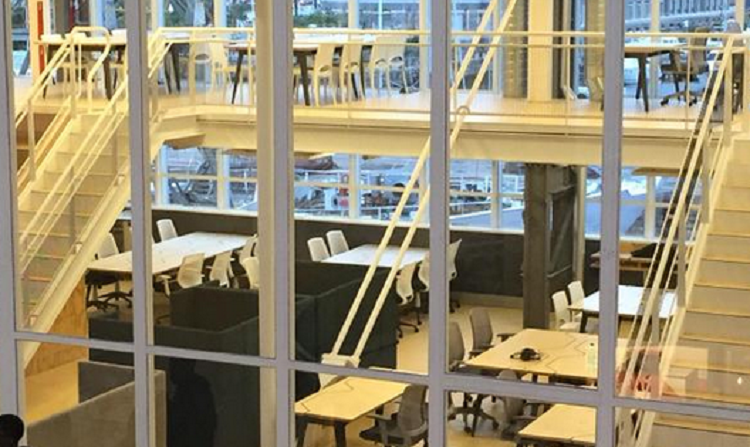Co-working is big in Africa, primarily due to cost of private office space and the low budgets of startups, entrepreneurs and freelancers. But setting up shop in a co-working space has additional benefits you would not find in traditional offices.
It isn’t just in Africa where co-working is seeing a boom. According to the most recent annual research by Deskmag, 70 per cent of co-working spaces globally say available desk space cannot keep up with demand, with more than one in two planning to expand.
Demand is only set to increase, with as much as 40 per cent of the world’s workforce likely to be freelancers, independent contractors and solo entrepreneurs by 2020, without the resources or need to find their own private office.
Even large corporates are getting in on the act, with the likes of Twitter, Google and Amazon, along with half of Fortune 500 companies, making temporary Regus desk space available to staff members when they need it. Regus alone, in its various facilities across the world, offers flexible desk space to more than one million people each day.
In Africa, where startups and entrepreneurs typically suffer from a lack of funding, the need for co-working spaces is probably even greater. There are hundreds of such spaces across the continent, with more opening every month. In July, Cape Town even hosted Africa’s first co-working conference.
But it isn’t just financial expediencies that make operating from a co-working space worthwhile from the point of view of a startup. There is much to be gained from doing so in other areas too.
Healthier, happier co-workers
Individuals or teams based out of co-working spaces are, apparently, healthier and happier. Research conducted by Officevibe has found that 70 per cent of people feel healthier when working from a co-working space. Such spaces are less stressful than traditional offices, and many spaces even run wellness initiatives such as yoga classes.
There is also the social aspect. Ninety-one per cent of people, according to Officevibe, have better interactions with others after co-working, while 60 per cent are more relaxed at home. It also breeds confidence, with 90 per cent saying they felt more confident after co-working. Gone are the days of private offices with people shut away from colleagues, the new way of working is more friendly, inclusive and stimulating.
More productive co-workers
Co-working spaces – most of them, anyway – are not just about free coffee and games of table football. It is natural that once a worker is healthier, more socially linked to colleagues, more relaxed, and more confident, they are likely to be more productive. Startups setting up shop in shared offices can look forward to greater productivity and focus.
According to Officevibe, 64 per cent of co-workers are better able to complete tasks on time, with 68 per cent saying they are able to focus better while co-working. Though these spaces are friendly and sociable, they are also places of work, and everyone there is there for a serious purpose. They are also melting pots of creativity and knowledge-sharing, stimulating people and leading to the creation of new ideas.
As a result, people in co-working spaces do better. Half the respondents to the Officevibe survey reported higher incomes. Deskmag found 75 per cent expected an increase in earnings over the ensuing 12 months, with only three per cent expecting losses. Most co-workers expected their workload to go up. So it isn’t just a cost-saving measure, it’s a money-making measure too.
It’s better than the coffee shop
Visit certain neighbourhoods of Cape Town, or the malls of Nairobi, and you’re likely to see a number of “coffee shop entrepreneurs” in every establishment, running their startups over a double espresso (or four). There is plenty of evidence that these entrepreneurs would be better off moving only a co-working space.
It isn’t only the evidence produced above about co-workers generally being happier and earning more money. It isn’t even that the coffee is usually free in co-working spaces, as opposed to the hefty charges of coffee shops (where plugging in a laptop can also be a pain, and Skype calls are likely to disturb fellow customers). There is plenty of evidence that mere proximity to other like-minded entrepreneurs and startups can boost your productivity and your business.
A study conducted by a team at Harvard University recently concluded that – in spite of this being the age of email – geographic proximity was vital to collaboration. Findings from thousands of academic papers found correlations between most cited papers and close distances between authors, leading to more impactful publications. The researchers found face-to-face communication more impactful, resulting in better conversations, problem-solving and brainstorming. Bounce ideas off your fellow co-workers, partner with them. The idea is collaboration.
The fact of the matter
The most crucial statistic of all from the Officevibe survey? It found that 92 per cent of people are satisfied with their co-working space. Imagine that kind of response from people asked about their traditional office space. And if you for some reason don’t like the space you’re in, moving is easy. In Woodstock, Cape Town or on Ngong Road, Nairobi, it could even merely be a case of lugging your laptop to the co-working space on the floor below or over the road.
Co-working spaces in Africa these days go far beyond Wi-Fi and free coffee. For both personal and professional reasons, their users are generally happier and better off, with friendly, collaborative environments populated by young, fun, driven professionals leading to lifelong friendships and growing businesses. Find one near you today.


